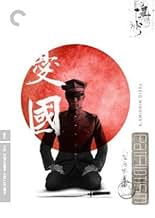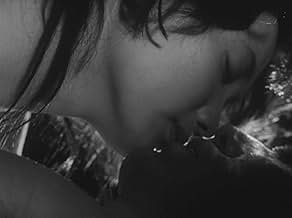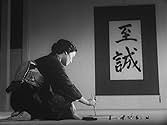IMDb RATING
7.4/10
2.2K
YOUR RATING
A Noh dramatization of the suicides of Lt. Shinji Takeyama and his wife Reiko. After participating in a failed 1936 coup and being ordered to execute his friends, he bids his wife an intimat... Read allA Noh dramatization of the suicides of Lt. Shinji Takeyama and his wife Reiko. After participating in a failed 1936 coup and being ordered to execute his friends, he bids his wife an intimate farewell and commits harakiri.A Noh dramatization of the suicides of Lt. Shinji Takeyama and his wife Reiko. After participating in a failed 1936 coup and being ordered to execute his friends, he bids his wife an intimate farewell and commits harakiri.
Featured reviews
The contribution of Yukio Mishima to the Seventh Art was no big deal, but it does have one or two sequences that are really intense. His patriotic fever has its portrait in this elegy about sex and death, the suicide as an art or as an act of honor.
I recommend this one only for those that are fascinates by the figure of the Japanese writer.
*My rate: 5/10
----------------------------------- ------------------- --------------------- -------------------- ---------------------
-------------------
-------------------
I recommend this one only for those that are fascinates by the figure of the Japanese writer.
*My rate: 5/10
----------------------------------- ------------------- --------------------- -------------------- ---------------------
-------------------
-------------------
Infrequently, the esteemed "Criterion Collection" DVD label puts out a Short Subject as a stand-alone release (as opposed to comprehensive collections, such as the recently-referenced Jean Painlevé one and another devoted to the works of Stan Brakhage), albeit reasonably priced – for them – at a much lower-than-usual tier. A couple of these were notable films worthy of such a pedigree – Alain Resnais' fascinating (if necessarily harrowing) depiction of concentration-camp atrocities NIGHT AND FOG (1955) and Albert Lamorisse's charming (and Oscar-winning) THE RED BALLOON (1956; actually issued as a dual-movie edition with the same director's WHITE MANE {1953}, which I own but have yet to check out).
This one, then, was an odd choice for such a distinction: not only is it not that well-known, even to more-than-casual film-buffs (I, for one, was completely unaware of it!) but, since it was a half-hour effort written, directed by and starring celebrated Japanese author Mishima, ideally it ought to have served as a great bonus feature on the same company's digital edition of Paul Schrader's semi-biopic MISHIMA: A LIFE IN FOUR CHAPTERS (1985; which, again, I do have a copy of but remains as-yet unwatched) – rather than ask potential buyers to fork out extra money for an additional disc! For the record, I had previously watched Kon Ichikawa's masterful rendition of Mishima's CONFLAGRATION (1958), as well as seen the author himself assume the lead role in Yasuzo Masumura's gangster thriller AFRAID TO DIE (1960); besides, I own other two adaptations of his work – THE MUSIC (1972), also by Masumura, and the Americanization of THE SAILOR WHO FELL FROM GRACE WITH THE SEA (1976).
Anyway, what we have here is a Silent movie (itself divided into 5 chapters) – the narrative's progression described exclusively via the text (included on the DVD in either the original Japanese with accompanying English subtitles, as I opted to acquire it myself, or a ready-made English translation) on a scroll held in front of the camera! – involving the aftermath of a failed coup d'etat. A military officer (Mishima) is asked to execute the men responsible but, as they are his friends and colleagues, he becomes conflicted by this grave assignment (hence, the title is ironic): his understanding wife knows what this entails – he shirks his duty by committing ritual suicide on the eve of the appointed task (but not before having spent the night with his spouse), to be followed by the woman herself (who subsequently has nothing to live for)!
The double "seppuku" is quite graphically handled, with a generous display of blood and entrails 'tarnishing' the otherwise impeccable and spare monochromatic setting! The plot may bear similarities to the legendary (and oft-filmed, including an ill-advised brand-new version) saga of "The 47 Ronin" but it had a chilling duplication in reality four years later when Mishima, himself a soldier with radical political beliefs, attempted an overthrow of authority and 'forced' (though some argue it was planned as such all along!) to take his own life when his 'noble' intentions left most of the witnessing 'brothers-in-arms' nonplussed and openly mocking! Talk of life imitating art!
This one, then, was an odd choice for such a distinction: not only is it not that well-known, even to more-than-casual film-buffs (I, for one, was completely unaware of it!) but, since it was a half-hour effort written, directed by and starring celebrated Japanese author Mishima, ideally it ought to have served as a great bonus feature on the same company's digital edition of Paul Schrader's semi-biopic MISHIMA: A LIFE IN FOUR CHAPTERS (1985; which, again, I do have a copy of but remains as-yet unwatched) – rather than ask potential buyers to fork out extra money for an additional disc! For the record, I had previously watched Kon Ichikawa's masterful rendition of Mishima's CONFLAGRATION (1958), as well as seen the author himself assume the lead role in Yasuzo Masumura's gangster thriller AFRAID TO DIE (1960); besides, I own other two adaptations of his work – THE MUSIC (1972), also by Masumura, and the Americanization of THE SAILOR WHO FELL FROM GRACE WITH THE SEA (1976).
Anyway, what we have here is a Silent movie (itself divided into 5 chapters) – the narrative's progression described exclusively via the text (included on the DVD in either the original Japanese with accompanying English subtitles, as I opted to acquire it myself, or a ready-made English translation) on a scroll held in front of the camera! – involving the aftermath of a failed coup d'etat. A military officer (Mishima) is asked to execute the men responsible but, as they are his friends and colleagues, he becomes conflicted by this grave assignment (hence, the title is ironic): his understanding wife knows what this entails – he shirks his duty by committing ritual suicide on the eve of the appointed task (but not before having spent the night with his spouse), to be followed by the woman herself (who subsequently has nothing to live for)!
The double "seppuku" is quite graphically handled, with a generous display of blood and entrails 'tarnishing' the otherwise impeccable and spare monochromatic setting! The plot may bear similarities to the legendary (and oft-filmed, including an ill-advised brand-new version) saga of "The 47 Ronin" but it had a chilling duplication in reality four years later when Mishima, himself a soldier with radical political beliefs, attempted an overthrow of authority and 'forced' (though some argue it was planned as such all along!) to take his own life when his 'noble' intentions left most of the witnessing 'brothers-in-arms' nonplussed and openly mocking! Talk of life imitating art!
This film prophetically (Yukio Mishima committed suicide in 1970) and dramatically portrays the ritual suicide of a dishonored Japanese patriot. It's an extraordinary short watch but may be a bit intense for those who dislike graphic gore. I doubt I will ever forget the experience of having seen this.
This is a very hard movie to rate or even review, as it is so foreign. Now I don't mean 'foreign' because it's made abroad, but 'foreign' because the entire story, style and spirit of this short film is alien to many out there who are not from an older generation in Japan. The film is a Noh play that is entirely without dialog--just music, LOTS of intertitle cards explaining the situation and a couple going through a long and drawn out ritual suicide!! See what I mean?! This ain't a Spielberg or John Ford film!! Instead, it's horribly violent and disgusting to watch because it is so real. Yet, at the time of its release, the film was admired because it was a lesson in honor and fidelity! It all stems from a real incident in 1936 when an officer was ordered to execute his friends who had participated in an attempted coup. So, if your idea of fun is watching a couple slowly and silently disembowel themselves, then by all means watch it. After all, the cinematography is amazingly good and is one of the prettier black & white films I have seen and the music is lovely as they eviscerate themselves. Sadly, I had hoped that the short was instead an explanation of WHY the coup was attempted in the first place--now THAT would have been interesting.
Kids: Don't try this at home!
Kids: Don't try this at home!
make sure to watch the version with the new score by aaron embry. it's much more beautiful as the ambient music adds so much to the film where the older music made it seem dated which was unfortunate because the cinematography was so ahead of it's time.
.
.
Did you know
- TriviaAfter Mishima's death on 25 November 1970, all prints of this film were rumored to have been destroyed by his wife Yoko. However, in August 2005, original film negatives were "discovered" at the late author's residence in Ota Ward, Tokyo. About 40 reels have now been found in what Japanese media refer to as an "airtight tea box". According to Hiroaki Fujii (78), the movie's producer (who at the time apparently urged Yoko to keep the original intact), the recovered elements are in "pristine condition". The film will be released on DVD by Shinchosha early in 2006.
- ConnectionsReferenced in Mishima - une vie en quatre chapitres (1985)
Details
- Release date
- Country of origin
- Language
- Also known as
- Rites d'amour et de mort
- Production companies
- See more company credits at IMDbPro
- Runtime
- 30m
- Color
- Sound mix
- Aspect ratio
- 1.37 : 1
Contribute to this page
Suggest an edit or add missing content


















